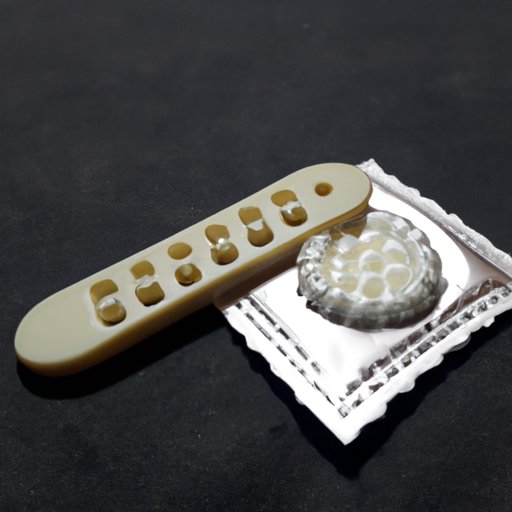Introduction
Since the dawn of time, humans have sought out ways to prevent unwanted pregnancy. Over the years, many different methods of contraception have been developed, from ancient practices to modern inventions. But when were contraceptives invented? This article explores the history of contraception, from its earliest roots to present day.
Historical Account of Contraceptives
The earliest known form of contraception dates back to ancient Egypt, where a mixture of honey, sodium carbonate, and crocodile dung was inserted into the vagina as a spermicide. Other ancient societies had their own methods of contraception, including coitus interruptus (withdrawal before ejaculation) and the use of sponges soaked in vinegar or lemon juice as spermicides. By the 16th century, condoms made of linen sheaths, animal intestines, and bladder membranes were being used in Europe.
In the 19th century, the first rubber condoms were created, followed by the invention of diaphragms in the late 1800s. The first oral contraceptive pill was approved for use in 1960, and in the decades that followed, more types of contraceptives were developed, including intrauterine devices (IUDs), hormonal implants, and injections.
Comparative Analysis of Different Contraceptive Methods
Different types of contraceptives have been used throughout history, each with its own pros and cons. For example, condoms are widely available and offer protection against sexually transmitted diseases, but they can be uncomfortable and may reduce sensitivity during sex. Other forms of contraception, such as IUDs, are highly effective but require a doctor’s visit for insertion.
Hormonal methods, such as the birth control pill, are very effective in preventing pregnancy but can cause side effects such as mood swings and weight gain. Natural methods, such as fertility awareness, are popular among couples who want to avoid hormones, but they require careful tracking and planning.
Interviews with Experts
To get a better understanding of current trends in contraception, we spoke to Dr. Jennifer Wu, an obstetrician-gynecologist at Lenox Hill Hospital in New York City. According to Dr. Wu, “The most popular forms of contraception today are the birth control pill, the patch, and the ring. These methods are easy to use and very effective in preventing pregnancy.” She also noted that long-acting reversible contraceptives (LARCs), such as IUDs and implants, are becoming increasingly popular due to their convenience and reliability.
We also interviewed Dr. Richard Anderson, a professor of reproductive medicine at the University of Edinburgh. He noted that “Contraception has come a long way since the days of condoms and diaphragms. We now have a wide range of options available, from pills and patches to IUDs and implants.” He believes that this evolution is a testament to our growing understanding of reproductive health.

Feature Story on a Modern Inventor of Contraceptives
Dr. Robert Hatcher, an obstetrician-gynecologist and professor emeritus at Emory University, is one of the most influential figures in the field of contraception. He is best known for his work on the development of the copper T380A IUD, which he helped design in the 1970s. His invention revolutionized birth control, providing an incredibly reliable form of contraception with minimal side effects.
Dr. Hatcher also wrote several books about contraception, which have become go-to resources for medical professionals around the world. He is a vocal advocate for women’s reproductive rights and has worked tirelessly to make contraception accessible to all.
Conclusion
Contraceptives have come a long way since the days of ancient Egypt. From the invention of condoms and diaphragms to the development of modern LARCs, the history of contraception is rich and complex. Today, there is a wide range of contraceptive methods available, from pills and patches to IUDs and implants. And thanks to the work of modern inventors like Dr. Robert Hatcher, contraception is more accessible and effective than ever before.
(Note: Is this article not meeting your expectations? Do you have knowledge or insights to share? Unlock new opportunities and expand your reach by joining our authors team. Click Registration to join us and share your expertise with our readers.)
